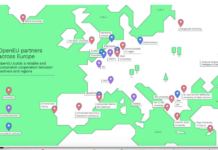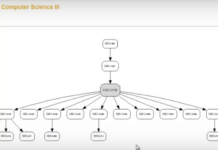Royal Bank of Canada (2018) Humans Wanted Toronto ON: Royal Bank of Canada
I have at last got hold of a full copy of this report that came out a couple of weeks ago. Much to my surprise, I found the report essential reading for anyone in education, mainly because it is relatively specific about the skills that the Canadian job market will need between 2018 and 2021, and the results were not quite what I expected to see.
Conclusions from the report
I can’t better the summary in the report itself:
1. More than 25% of Canadian jobs will be heavily disrupted by technology in the coming decade. Fully half will go through a significant overhaul of the skills required.
2. An assessment of 20,000 skills rankings across 300 occupations and 2.4 million expected job openings shows an increasing demand for foundational skills such as critical thinking, co-ordination, social perceptiveness, active listening and complex problem solving.
3. Despite projected heavy job displacement in many sectors and occupations, the Canadian economy is expected to add 2.4 million jobs over the next four years, all of which will require this new mix of skills.
4. Canada’s education system, training programs and labour market initiatives are inadequately designed to help Canadian youth navigate this new skills economy.
5. Canadian employers are generally not prepared, through hiring, training or retraining, to recruit and develop the skills needed to make their organizations more competitive in a digital economy.
6. Our researchers identified a new way of grouping jobs into six “clusters,” based on essential skills by occupation rather than by industry.
7. By focusing on the foundational skills required within each of these clusters, a high degree of mobility is possible between jobs.
8. Digital fluency will be essential to all new jobs. This does not mean we need a nation of coders, but a nation that is digitally literate.
9. Global competencies like cultural awareness, language, and adaptability will be in demand.
10. Virtually all job openings will place significant importance on judgment and decision making and more than two thirds will value an ability to manage people and resources.
So, no, automation is not going to remove all work for humans, but it is going to change very much the nature of that work, and it is in this sense that technology will be disruptive. Workers will be needed in the future but they will need to be very different workers from the past.
This has massive implications for teaching and learning and the bank is in my view correct in arguing that Canada’s education system is inadequately designed to help Canadian youth navigate this new skills economy.
What skills will be in demand?
Not the ones most of us would have thought that a bank would identify:

You will see that the most in demand skills will be active listening, speaking, critical thinking and reading comprehension, while the least important skills include science, programming and technology design.
In other words, ‘soft skills’ will be most needed for human work. While this may seem obvious to many educators, it is refreshing to hear this from a business perspective as well.
Methodology
How did the Royal Bank not only identify these skills and their importance, but also how did it put actual numbers in terms of workers against these skills?
The data were derived from an interesting application of big data: an analysis of the skills listed on the web in ‘future-oriented’ job advertisements through media such as LinkedIn, combined with more qualitative interviews with employers, policy-makers, educators and young people.
What does this mean for teaching and learning?
There are several challenges I see:
- first, getting teachers and instructors to accept that these (and other) skills need to be taught within any subject domain;
- second, as these skills are not likely to be developed within a singe course, identifying how best to teach these skills at different ages, throughout a program of study, and indeed throughout life;
- third, codifying these skills in terms of appropriate teaching and assessment methods; too often educators claim they are teaching these skills but if so, it is often implicit or not clear how or even if students acquire these skills.
- we need to determine how best digital technology/e-learning can support the development of skills. For instance well-designed digital learning can enable skills practice and feedback at scale, freeing teachers and instructors to focus on what needs to be done on a face-to-face basis.
It’s not just about work
The Royal Bank has done a very good job in identifying work-force skills, but these are not the only skills needed in a digital age. Equally if not more important are the skills we need as humans in handling everyday life in a digital age. Examples would be:
- a wide range of non-work oriented digital literacy skills, such as managing our digital identities (see UBC’s Digital Tattoo as an excellent example) so we as individuals have at least some control over the technology and how it is used
- understanding the organization and power structures of digital companies and digital technologies: one example might be understanding how to identify and challenge algorithmic decision-making, for instance
- teaching the important non-digital skills necessary in a digital society (for instance, mindfulness, or social awareness and conduct in both real and online environments).
Identifying such skills and finding ways to integrate the development of such skills within the curriculum is a major challenge but essential if we are to not only survive but thrive as humans in a digital world. We are just getting started on this, but it’s none too soon. In the meantime, the Royal Bank has done a good job in making the discussion about 21st century skills more concrete and practical.










 Dr. Tony Bates is the author of eleven books in the field of online learning and distance education. He has provided consulting services specializing in training in the planning and management of online learning and distance education, working with over 40 organizations in 25 countries. Tony is a Research Associate with Contact North | Contact Nord, Ontario’s Distance Education & Training Network.
Dr. Tony Bates is the author of eleven books in the field of online learning and distance education. He has provided consulting services specializing in training in the planning and management of online learning and distance education, working with over 40 organizations in 25 countries. Tony is a Research Associate with Contact North | Contact Nord, Ontario’s Distance Education & Training Network.


Excellent stuff as always!!!
Hi Tony,
Thanks for posting the report.
As you note: “teaching the important non-digital skills necessary in a digital society (for instance, mindfulness, or social awareness and conduct in both real and online environments).
In so much of the discussion about retooling/reskilling we neglect talking about self-awareness, self-discovery, and all that that suggests. I think the mindfulness “movement” may have helped these conversations focus more on creating learning/training which develops the “whole person,” but so much of the talk devolves to layering on new skills and practices. If we just taught more STEM courses… and that sort of thing.
Howard
Thank you for posting the RBC report. As a former Ss Principal, I’m particularly impressed with #s 4 , 8 , 9 and 10. Senior secondary students aren’t exposed to enough critical , long form , non fictional books to appreciate critical arguement building. The current emphasis on test preparation and taking isn’t advancing life long learning if we examine evidence.
Experience shows that when we expect more reading from the teaching population, they are prepared to abandon much of what the obsolete Ontario curriculum suggests. Finland has made teacher training and learning a major priority. It’s not the case in Ontario where RBC will hire many of their employees from.
The report posits a reinvention of a Command and control learning structure to something quite different. Maybe we begin with a Royal Commission on Digital Learning to hear some voices throughout the system, most particularly students,
Interesting comments, Paul. I’m wondering how many other provincial school curricula actually encourage the type of teaching and learning that this report suggests will be needed. I’d like to hear from school teachers on this – as well as post-secondary education instructors
Will training for skills most important in the jobs of the future work well in large-scale settings by 2026? Respondents in this canvassing overwhelmingly said yes, anticipating that improvements in such education would continue. However, many believe the most vital skills are not easy to teach, learn or evaluate in any education or training setting available today.